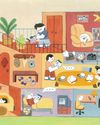
WHEN KATIE CLOW and her research students arrive in a windowless lab at the Ontario Veterinary College, in Guelph, Ontario, on a drizzly late-fall morning, envelopes have piled up on their workbench like a manila snowdrift. They slip on white coats and reach for scissors to start slitting open the padded packets. Each one contains a slip of paper and a small plastic vial or two. The paperwork lists the name of a veterinary clinic somewhere in Canada and the identifying details of someone’s pet: a six-year-old golden retriever in Moncton, a four-year-old tabby in Victoria.
Inside each corresponding vial is a tick — or fifty — plucked from the body of that pet and mailed in for research. With her team, Clow, a professor of veterinary medicine with expertise in epidemiology and ecology, opens the vials and tips the rigid bodies of the arachnids into a petri dish. Unless they’re not dead: after a week or two in the custody of Canada Post, they sometimes emerge and start scurrying across the bench. When a live one tumbles out in front of research assistant Kiera Murison, she snatches a pair of tweezers to pluck it up and deposits it into a vial of ethanol, with a whispered apology, swirling it around to bring a prompt demise.
This story is from the September/October 2020 edition of The Walrus.
Start your 7-day Magzter GOLD free trial to access thousands of curated premium stories, and 8,500+ magazines and newspapers.
Already a subscriber ? Sign In
This story is from the September/October 2020 edition of The Walrus.
Start your 7-day Magzter GOLD free trial to access thousands of curated premium stories, and 8,500+ magazines and newspapers.
Already a subscriber? Sign In

Invisible Lives
Without immigration status, Canada's undocumented youth stay in the shadows

My Guilty Pleasure
"The late nights are mine alone, and I'll spend them however I damn well please"

Vaclav Smil Is Fed Up
The acclaimed environmental scientist is criticizing climate activists, shunning media, and stepping back just when we need him most

It's Time for a Birth Control Revolution
What the pill teaches us about the failure - and future - of women's health care

Would You Watch a Play about Hydro Electricity?
How documentary theatre struck a chord in Quebec

Still Spinning
One record chain has bet big on a new appetite for physical media

Just So You Know, I Love My Mother
In many ways, multi-generational living makes sense. But that doesn't make it easy

Art of the Steal
Why are plundered African artifacts still in Western museums?

Canada in the Middle
What role can we play in easing the war in Gaza?
Canadian Multiculturalism: A Work in Progress
As we mark fifty years since the adoption of Canada’s federal multiculturalism policy, human rights advocate AMIRA ELGHAWABY celebrates its merits and reflects on the work that is yet to be done when it comes to inclusion, acceptance, and fighting systemic racism in our country.